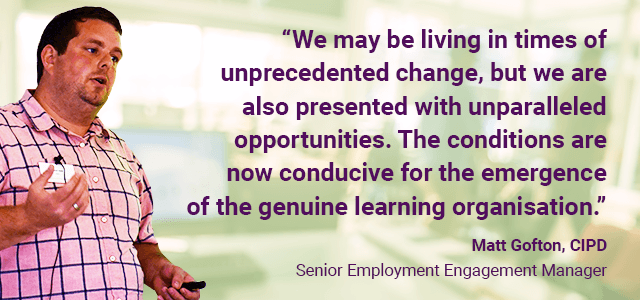Friedrich Nietzsche said, “You have your way. I have my way. As for the right way, the correct way, and the only way, it does not exist.”
This philosophy applies to learning. It’s one that every teacher, instructor or instructional designer should aim to achieve. It’s not easy to treat every learner as an individual, but it’s how to get the best of them.
It’s also a philosophy promoted by the Chartered Institute of Personnel and Development or CIPD, the not-for-profit organisation with the mission statement, ‘To champion better work and working lives.’ It is their belief that the ability for organisations to successfully evolve is ultimately determined by the capability of their staff. Transformation of the organisation is inextricably linked to the transformation of individuals, and for that to be a reality, learning has to be at its core.
It’s a philosophy shared by Nimble Elearning. It’s also why CIPD’s Employer Engagement team, led by Matt Gofton, have supported Nimble in disseminating this advice and promoting such innovative practice.
The twenty-first century workplace is a complex environment – one that demands increasing flexibility from its employees. Businesses need to be agile and respond to needs quickly and efficiently. These factors place increasing pressures on training and staff development; therefore, twenty-first century solutions are needed to do this. While elearning offers solutions in principle, the nature and quality of the learning is where the real difference is made. Setting clear and measurable learning objectives, assessing the effectiveness of interaction and interventions, are just two examples which illustrate this difference.
A consistent feature of best practice seen by CIPD and Nimble, is when organisations don’t only rely on their instructional designers to author courses. The Nimble Awards over the last two years have identified people who might be defined as “High Performers” in their organisation. These are people who have high levels of competence and skills, a wealth of experience and the ability to communicate it.
Such people can successfully create excellent learning resources when they’re left to focus on the learning, rather than juggling knowledge of the elearning platform as well. Nimble Award winners talk about how the platform’s simplicity and ease-of-use allows them to retain this learning focus.
By assimilating High Performers into the authoring process, organisations can enhance the development of a learning culture. It generates an environment that broadens the definition of learning and empowers it by including more people such as line managers and peers. This results in a culture which is less “top down” but rather where learning is shared. It can mean that more employees have knowledge, skills and experiences that can be called upon to share with others. The keyword here is collaboration and it relies on more of a flattened management structure where learning is concerned.
We began this article by emphasising the importance of individualised learning – the individual learner. Such a philosophy isn’t easy when learning resources are created by other individuals or small teams. Research consistently shows we structure learning in the way we prefer to learn ourselves, therefore it requires enormous self-awareness and an excellent understanding of the learning process to avoid this from happening.
However, whilst the breadth and variety within any learning culture offsets this challenge, it does require a bold approach. But, as Matt Gofton points out, ‘the New Learning Organisations respond faster to change through effective problem solving and productivity, which is increased with talent strategies to develop and keep the best people. Notable improvements are seen in performance, profitability, sustainability and customer satisfaction. We may be living in times of unprecedented change but we are also presented with unparalleled opportunities. The evidence is clear; the conditions are now conducive for the emergence of the genuine learning organisation.’
One where individuality is crucial.


0 Comments